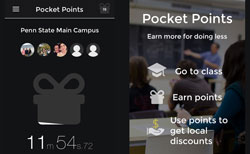An application called Pocket Points, first introduced on the Apple app store in Aug. 2014, rewards students with points for not checking their phones during class – points that they can later redeem for food at participating locations.
The app was developed by Mitch Gardner and Rob Richardson, who were college students when they came up with the idea in the spring of 2014. Richardson was sitting in a 150-person lecture hall and noticed how many of his classmates were playing with their phones and not paying attention to the lecture.
“I knew there had to be some sort of incentive to get kids to put their phones away,” said Richardson, in an interview with USA Today. That incentive was a points system that could be used for free or discounted items from local vendors who participated.
The free app only works on campus and operates on a simple premise: students first open the Pocket Points app, then lock their phones. As soon as this is done, points begin to accumulate, and the longer the phone stays locked, the more points they can get. Points are also awarded based on how many people are on the app at the same time.
Richardson and Gardner orginally attempted to convince professors to reward students with extra credit for staying off their phones. However, a focus group session revealed that professors disagreed with that idea – they didn’t like the thought of rewarding students for something that, in their opinion, they should already be doing. After this focus group, the two reached out to local food companies, and found out that those companies were thrilled with the idea.
Richardson, a computer science student, worked on the coding for the app; Gardner, a marketing major, focused on the marketing and advertisement, making sure that the word spread. Within a month, 30 percent of the Chico State student body (the university where the app was first developed) had downloaded the app. As its success spread, so that did the campus reach – in the spring of 2015, the app expanded to campuses such as Penn State, University of Michigan, and University of Arizona.
Campus representatives market the app and work with local vendors to find deals for students in their respective areas. Gardner says he and Richardson don’t want people to abuse the app, so they’re trying to control accessibility so students can’t earn points from dorms. While Pocket Points doesn’t solve everything, he says it mitigates some problems in the classroom.
The University is not currently included in the app’s reach, but students on campus seemed enthusiastic about the idea.
“It’s a great idea,” said Owen Flanagan, a sophomore music major. “Kids would definitely put away their phones for free food.”
His sentiments are echoed by junior graphic design major Krystal Suriani. “It’s awesome,” she said. “I live off-campus; it’d be nice to know that after a few classes I’d have enough points to get dinner.”
While students may not be able to use the app and earn points yet, those who take classes with Dr. Shannon Hokanson, a lecturer in the communication department, will be able to get extra credit if they relinquish their phones during class.
“I noticed a lot of students on their phones, but I didn’t want to create a contentious atmosphere in the classroom,” she said. “I understand – when I’m not teaching, I’m on mine, so I figured, I had to come up with something that isn’t punitive, something that doesn’t damage my classroom climate, but gets them off of it. I’ve started doing it this semester, and it’s going great.”
Students in Hokanson’s class are given the chance to deposit their phones into a basket that she keeps on hand. Those that do so – and she says that students do take her up on the offer – are given extra credit points, which can be used to benefit their grades.
“It’s rare that someone doesn’t do it,” she said. “In fact, it almost never happens.”
While Pocket Points may not have a presence yet, Richardson and Gardner are constantly increasing the reach of the app, and the team has weekly meetings to continue to innovate their project. The app can be downloaded for free on the Apple App Store.
IMAGE TAKEN from http://www.kesato.com/blog/technology/us-college-students-can-get-free-food-from-not-using-their-phones-in-class/



